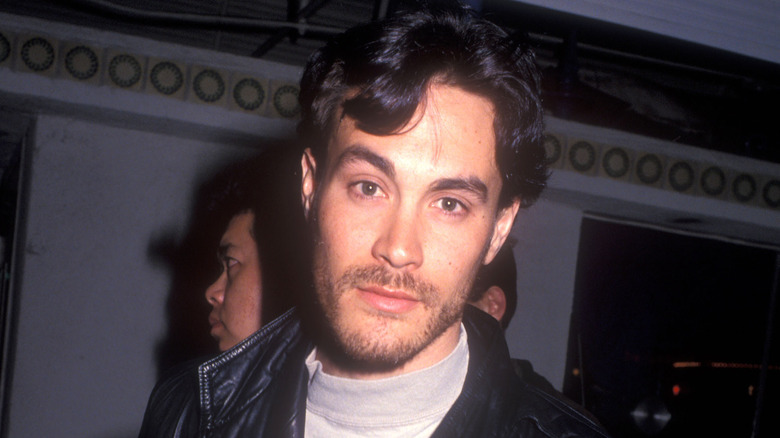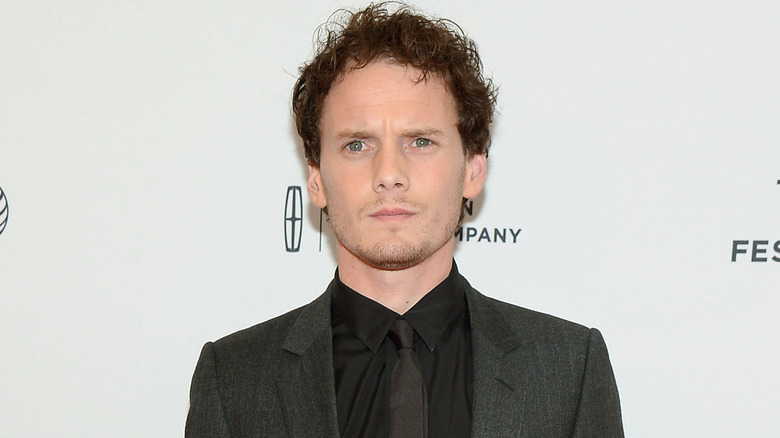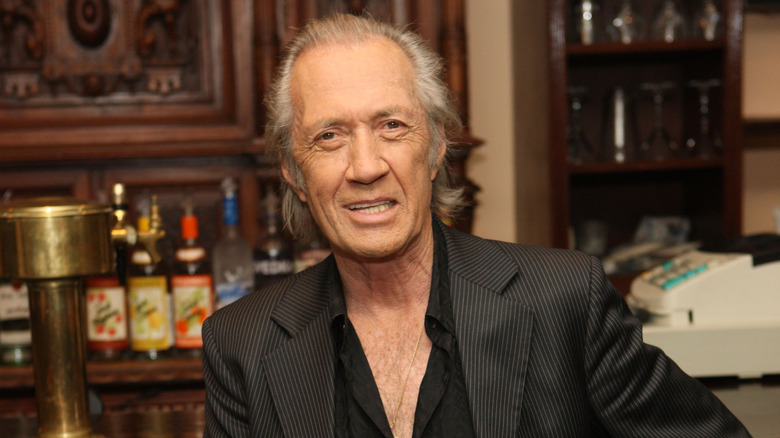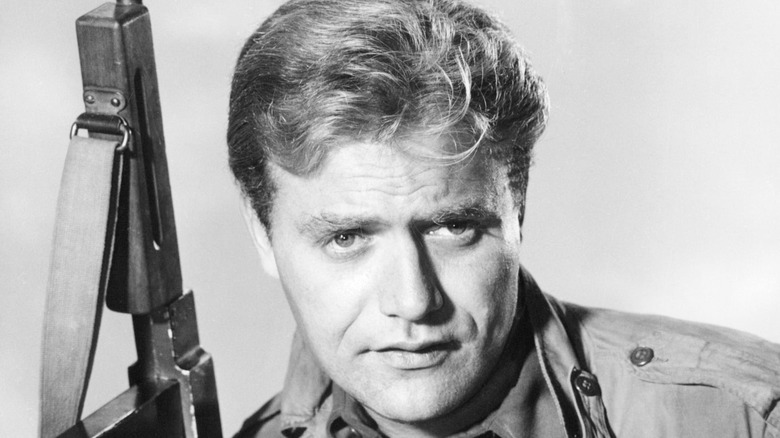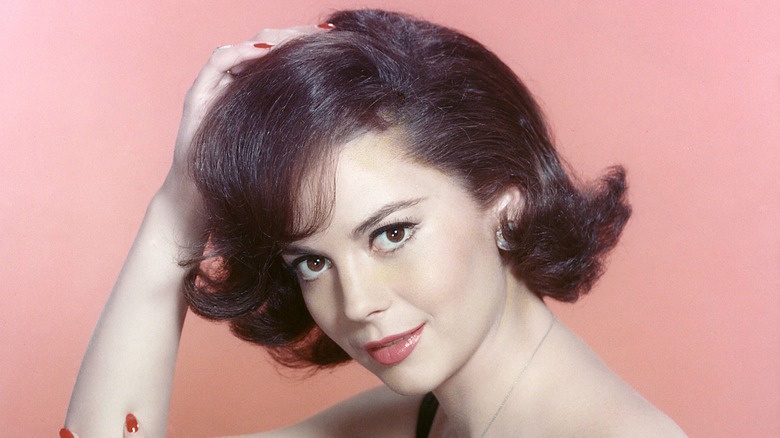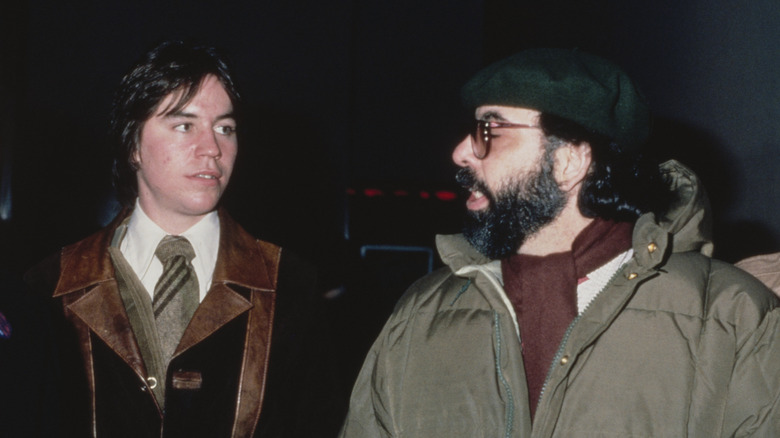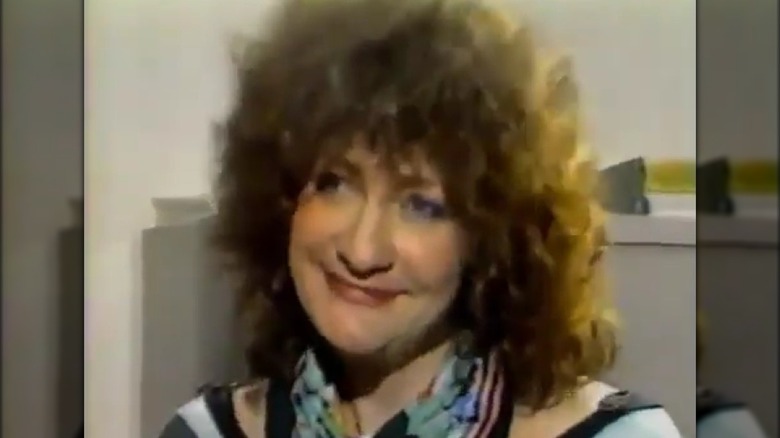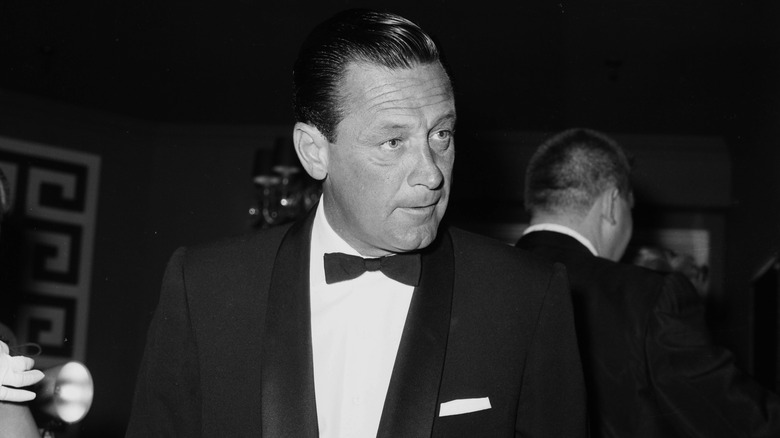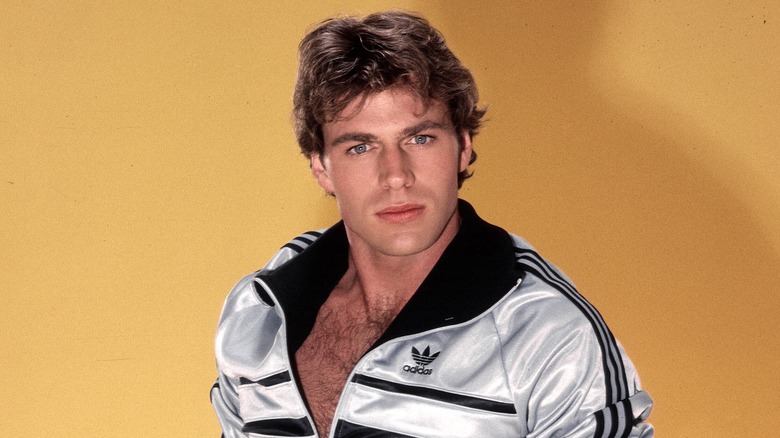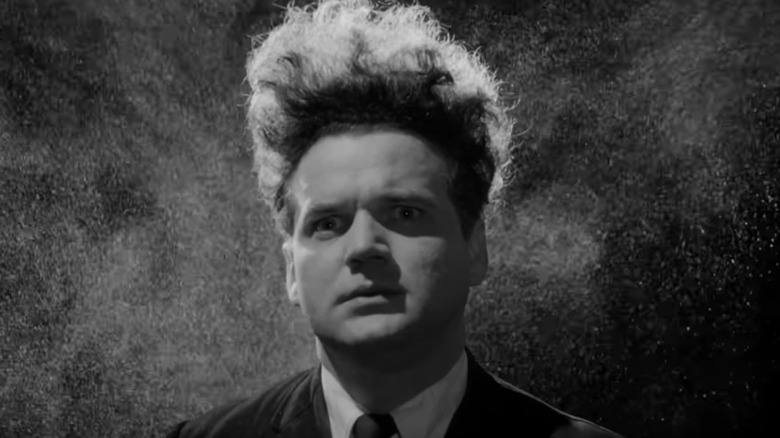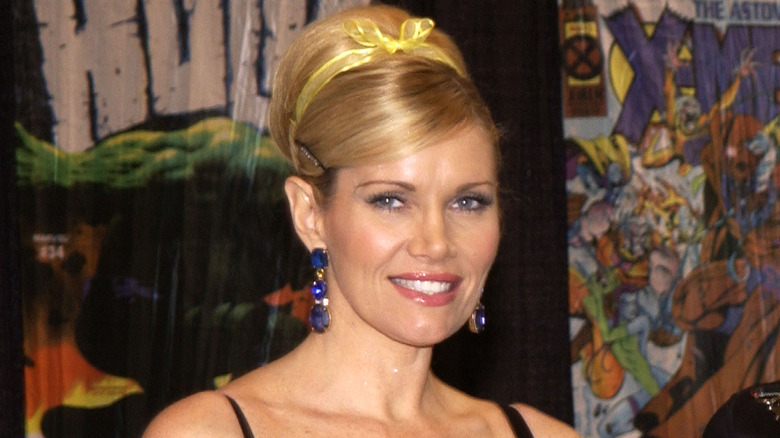Actors Who Died In Bizarre Ways
Movie stars have been a sort of moneyed, aristocratic class unto themselves from the early days of cinema, but every last one of them has one thing in common with the least glamorous among us: The Reaper comes for us all. As it turns out, fame (regardless of what the song says) decidedly does not mean you're gonna live forever, and money can't buy off the immutable laws of nature.
Sometimes, when that ol' Reaper does make his appearance, he does so when he is least expected, under the most bizarre of circumstances. This, of course, is also true for everyone from common folk to heads of state — but when the means of death for those who make their living acting out fantastic yarns turns bizarre, it can seem a bit too much like one of those fantastic yarns manifesting in grim reality. Here, then, are a few times that some very, very famous actors died in very, very peculiar ways.
Anne Heche
Talented though she was, Anne Heche was perhaps best known for starring opposite Harrison Ford in the 1998 drama "Six Days Seven Nights" and for her long-term relationship with Ellen DeGeneres, a talk show host who turned out to be a terrible person. Throughout her career, Heche had been open about her belief that she had serious undiagnosed mental health issues stemming from a difficult childhood, and also about her past heavy drug use — but despite these issues, she amassed an enviable body of work as an actor.
Unfortunately, her life came to an end in bizarre fashion on the morning of August 5, 2022. Heche was driving her Mini Cooper in a Los Angeles suburb when she inexplicably lost control of the vehicle and crashed into a private residence. The ensuing blaze was so intense that it took twenty minutes for firefighters to beat the flames back enough to move the car, to say nothing of getting Heche free. Miraculously, Heche initially survived, hanging on for nearly a week before succumbing to her injuries on August 11.
Investigators suspected at first that the crash was due to drugs or alcohol, but this was not the case. In December, the L.A. Coroner's Office announced that there was no evidence pointing to Heche being impaired in any way at the time of the accident.
Brandon Lee
The untold truth of the legendary Bruce Lee is that his son Brandon Lee — had he lived — may have eclipsed even his famous father in star power. Like his dad, Brandon Lee was an explosively potent martial artist, possessed of a metric ton of charisma and a formidable screen presence; his early features, such as 1991's "Showdown in Little Tokyo" and 1992's "Rapid Fire," were proof positive of these qualities. But it was his breakthrough lead role in the 1993 supernatural thriller "The Crow," an adaptation of the 1989 indie comic of the same name, that served as a true showcase for his talents and made him a household name in the process. Unfortunately, it was also his final role, as his life was cut short due to a freak mishap with just two weeks of filming left.
Lee was killed when he was shot in the abdomen by a prop gun fired by actor Michael Massee — a gun which had been improperly handled, and which contained a portion of a dummy round in one of its chambers. The rising star was only 28 years old, and although he was found definitively to have not been at fault, Massee never truly recovered after Brandon Lee's death.
"The Crow" went on to become a box office success and a cult classic — but one can't help but wonder what might have been if the freakish circumstances that led to its star's death had played out differently.
Anton Yelchin
Former child actor Anton Yelchin had made a name for himself with minor roles on film and television before breaking out at the age of 17 with his performance in the brutal 2006 drama "Alpha Dog." Just three years later, he landed the plum role of Pavel Chekov in J.J. Abrams' "Star Trek" reboot, reprising the role in that film's two sequels; high-profile appearances in "Terminator: Salvation" and the acclaimed horror-thriller "Green Room" followed. His was a star on the rise, until the flukish incident that took his life in 2016.
The actor had parked his 2015 Jeep Cherokee in his driveway, and was checking his mail when the vehicle slipped out of gear and rolled straight toward him. It slammed him into a security fence, pinning him there, and he died at the scene from asphyxiation and blunt injuries; he was just 27 years old. Tragically, the incident should never have happened. Apparently unbeknownst to Yelchin, the vehicle in question was under recall at the time, and had a known issue with rolling away just as Yelchin's did on that fateful day. In 2018, the automaker settled a lawsuit brought by Yelchin's parents, though the terms of the settlement were not disclosed.
David Carradine
With his steely good looks and intimidating presence, David Carradine carved out a decades-long career in film and television. He was a mainstay in Westerns before famously starring in the TV series "Kung Fu," and while many of his '80s and '90s credits consisted of TV guest spots and B-movies, he experienced a serious career resurgence in the early '00s. Carradine played the title role in Quentin Tarantino's two-part feature epic "Kill Bill," a would-be trilogy that was never finished, and appeared in guest roles in hit TV shows like "Medium" and "Alias." In 2009, though, his career and life were cut short; he was found dead in the closet of a hotel room in Bangkok, Thailand, and while authorities first suspected death by suicide, this turned out not to be accurate.
It has since been alleged that Carradine was instead partaking in the dangerous sexual practice known as auto-erotic asphyxiation, or the controlled cutting off of oxygen to the brain in order to heighten sexual pleasure. The finding was bolstered by court documents filed in his divorce from his ex-wife Marina Anderson, in which she alluded to Carradine's history of "deviant sexual behavior."
It was an unfortunate end to a storied life and career; several projects featuring Carradine were released posthumously, including the thriller "The American Connection," which began production in 2007 but didn't see the light of day until 2021.
Vic Morrow
Hollywood legend Vic Morrow, perhaps best known as the star of the '60s TV series "Combat!," had settled into a career of guest spots and feature-supporting roles when he was tapped to lend his considerable skill to a rather high-profile project: "Twilight Zone: The Movie," a feature film revival of the iconic TV series. In the lead-off segment "Time Out," Morrow portrayed Bill Connors, an unrepentant racist and misogynist who finds himself supernaturally thrust into the shoes of those he despises the most. The segment's climax originally saw Connors, living the experience of a Vietnamese peasant during the Vietnam War, frantically attempting to rescue two children as a U.S. Army helicopter fires on them — a scene that was unceremoniously cut after its filming went tragically wrong.
It was later found that pyrotechnics used in the scene caused damage to the helicopter, causing veteran pilot Dorcey Wingo to lose control of the craft, which crashed directly on top of Morrow and child actors Myca Dinh Le and Renee Shin-Yi Chen. Renee was crushed by the helicopter, and Morrow and Myca were decapitated by its main rotor blade. In a first for Hollywood, the segment's director John Landis, producer George Folsey, Jr., Wingo, and two others were tried criminally for their actions on set; after a sensational ten-month-long trial, all parties involved were acquitted.
Natalie Wood
Natalie Wood was one of the few actresses to bridge the gap between Old and New Hollywood. As a child actress in the '40s, she appeared in the 1947 edition of "Miracle on 34th Street"; as a teenager, she co-starred with James Dean in "Rebel Without a Cause," and she portrayed Maria in the classic 1961 musical "West Side Story." By the late '60s and '70s, she had successfully transitioned to adult fare like the sex comedy "Bob & Carol & Ted & Alice," and in the early '80s, she was tapped to star in VFX wizard Douglas Trumbull's sci-fi thriller "Brainstorm." This would be her final role — due to a fateful yacht trip with her husband, Robert Wagner, and her co-star Christopher Walken.
By all accounts, Wood and Wagner got into a drunken argument aboard the boat during the night of November 28, 1981; Wood somehow ended up overboard, and her body was found the next morning a mile from the yacht. Authorities ruled the death accidental, but the investigation was reopened in 2011; seven years later, the Los Angeles County Sheriff's Department officially named Wagner as a "person of interest" in her death, and although he has always denied any wrongdoing, there are those who to this day believe Wagner killed Natalie Wood.
In 2020, Wood's biographer Suzanne Finstad claimed to have unearthed new witnesses who had information that would prove that Wood's death was no accident — but as of mid-2024, the case is still unresolved.
Gian-Carlo Coppola
Gian-Carlo Coppola, the son of Hollywood icon Francis Ford Coppola, was just beginning to make his presence known in Hollywood. As a boy, he appeared in bit parts in his father's classics "The Godfather," "The Conversation," and "Apocalypse Now," and as a young man, he popped up in a larger role in 1983's "Rumble Fish." He also worked as a producer on the classic 1983 coming-of-age film "The Outsiders," and was working as a camera operator on "Gardens of Stone" in 1986, when a freakish boating mishap took place during a break from shooting.
Coppola and Griffin O'Neal, the son of actor Ryan O'Neal, had been drinking fairly heavily and were riding in a boat that attempted to cut between two others. They failed to realize, however, that the rear boat was actually being towed by the lead one — and both young men came into hard contact with the tow line. O'Neal survived the accident, but 22-year-old Coppola — who was driven into the floor of the craft and suffered serious head injuries — did not.
In a 2020 interview with Vulture, Francis Ford Coppola cited "Gardens of Stone" as the one film he wishes he had never made; "It cost me everything, and that was one of the movies I made at a time when I had to make a movie every year to just keep my house and my household together," he said. "I fantasize [about] having not made 'Gardens of Stone.' I wouldn't have lost my son."
Jane Dornacker
She may never have been a household name, but Jane Dornacker was a woman of many talents. She began her career in show business as a comedienne, then briefly performed with a band called Leila and the Snakes before joining legendary Bay Area rockers The Tubes in the late '70s. In 1983, she launched her acting career, appearing in a small role in that year's historical drama "The Right Stuff," and was also known for her irreverent stints as a radio traffic reporter, first for KFRC San Francisco and later for WNBC New York City. In April 1986, Dornacker and her pilot managed to swim to safety when the helicopter she was riding in crashed into the Hackensack River — but in a second crash just months later, she was not so lucky.
Dornacker was in the middle of her traffic report when, according to witnesses, the aircraft simply stalled out and plummeted into the Hudson River. Emergency responders were on the scene within minutes, but Dornacker was unresponsive when pulled from the water, and she was later pronounced dead at a local hospital. Speaking with The New York Times, her friend Steven Sparr shared that Dornacker "was afraid of going up again" after the earlier accident, but that "she knew she had to do it."
William Holden
One of the great actors of Hollywood's Golden Age, William Holden appeared in a slew of classics over several decades, from Billy Wilder's 1950 opus "Sunset Boulevard" to Sidney Lumet's media-skewering 1976 masterpiece "Network." He was the quintessential old-school actor, and like many of his peers, he was a bit of a drinker. This, unfortunately, was a factor in the freak accident that led to his death in 1981.
Holden was drinking alone in his Hollywood apartment when he apparently slipped on a throw rug, smacking his head on a bedside table with such force that it punched a hole in a nearby wall. Still conscious, Holden tried to tend to the profusely bleeding two-inch gash in his forehead with a few tissues, but to no avail; he passed out, and he soon bled to death. The coroner who attended to Holden would later say that he had registered a truly eye-watering blood alcohol level of 0.22, and was likely totally unaware of just how badly he had hurt himself; he further noted that although Holden probably lived for about half an hour after sustaining the injury, it appeared that he had not tried to call for help.
Jon-Erik Hexum
Impossibly handsome and ridiculously chiseled, Jon-Erik Hexum was practically made for the lead role in a series that could only have been created in the '80s: "Cover Up," in which he portrayed a former Green Beret turned male model who, accompanied by a lovely fashion photographer played by Jennifer O'Neill, conducted covert intelligence operations around the globe. The series lasted only one season, which very well may have been the case even if Hexum had not made a grievous error in judgment, becoming one of the surprisingly many actors to be fatally injured on set.
Apparently unaware that blanks could still be quite dangerous if fired into your temple at extremely close range, the actor was simply trying to make a funny after learning that there would be delays while shooting an episode of the series in October 1984. According to Entertainment Weekly, he asked his castmates, "Can you believe this crap?" before picking up the pistol, holding it to his head, and pulling the trigger; the blast fractured his skull and propelled a bone fragment into his brain, and despite the best efforts of doctors to save him, he was declared brain dead six days later. Perhaps the only silver lining: Hexum was an organ donor, and his heart saved the life of a former Navy SEAL and father of two.
Jack Nance
Jack Nance enjoyed a three-decade career in film and television, but he will forever be associated with one role: that of Henry Spencer, the protagonist of David Lynch's surrealist 1977 masterpiece "Eraserhead." The actor landed steady work throughout the '80s and '90s, and continued to work with Lynch in projects such as the iconic TV series "Twin Peaks," as well as features like "Wild at Heart" and "Lost Highway." In 1997, a simple trip down the street from his home in Pasadena to a local donut shop turned into a bizarre circumstance that ultimately cost Nance his life.
Witnesses told authorities that Nance got into a verbal altercation with two men outside the shop, one which turned physical; Nance was punched in the head during the scrap, but walked away from the scene, returning to his apartment. Unfortunately, this was all it took to do Nance in; he was found dead the following morning at his home by a friend who came by to check on him, and the cause of death was ruled to be blunt force trauma to the head. Speaking with the press, Nance's old friend Lynch did not seem terribly surprised, saying that Nance could sometimes "be verbally abusive" toward people who annoyed him. He also noted that Nance was not in fantastic shape, deadpanning, "Jack always said he wouldn't be too hard to kill" (via Los Angeles Times).
Lana Clarkson
Lana Clarkson eked out a list of credits spanning two decades, mostly as a guest performer on TV series like "Three's Company" and "The A-Team," along with appearances in several feature films — notably, in a key role in the classic, bizarro 1987 sketch comedy feature "Amazon Women on the Moon." In 2003, she was working as a hostess at the Sunset Strip's House of Blues, where she met legendary record producer Phil Spector — a meeting that very quickly spiraled into one of the most infamous murder cases in Hollywood history.
Spector's volatile temper was just as legendary as his musical accomplishments, and just hours after their meeting, the producer's chauffeur called authorities to report that Clarkson had been shot through the mouth with one of Spector's pistols at his residence. Spector tried to claim to authorities at various points that the gun went off by accident, or that Clarkson had shot herself — but ultimately, he was tried twice for her murder. The first trial, in 2007, ended in a hung jury; the second, in 2009, resulted in a conviction, with Spector sentenced to 19 years to life. In 2014, he was moved to a secure healthcare facility due to ill health, and he died in state custody in 2021 at the age of 81.
If you or anyone you know needs help with addiction issues or mental health, is struggling or in crisis, contact the relevant resources below:
-
The Substance Abuse and Mental Health Services Administration website or contact SAMHSA's National Helpline at 1-800-662-HELP (4357).
-
The Crisis Text Line by texting HOME to 741741, call the National Alliance on Mental Illness helpline at 1-800-950-NAMI (6264), or visit the National Institute of Mental Health website.
-
Call or text 988 or chat 988lifeline.org


